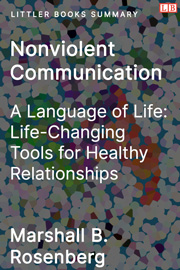Book Description
A powerful guide to improving communication and conflict resolution skills for more harmonious relationships in personal and professional settings.
If You Just Remember One Thing
Coming soon.
Bullet Point Summary and Quotes
- Life-alienating communication refers to the language we use to alienate ourselves instead of building connections.
- Moralistic judgments are life-alienating. They are critical or insulting words we use to label someone as bad or wrong (e.g., “selfish,” “stupid,” etc).
- A study shows that countries with language that contains more judgmental words have more violent crimes.
- Instead of passing judgments, identify the needs behind the feelings.
- Example: If your child eats too many snacks at a party, instead of calling her selfish, notice that you really are concerned about her health and have the need to be fair to others at the party. Explain your needs to the child while acknowledging your child's need to enjoy food.
- Nonviolent Communication (NVC) involves observing objectively, expressing feelings, identifying needs, and making a request for action.
- Example: If your child leaves his toys in a mess, instead of calling him messy and ordering him to clean up immediately, try saying, “When I see your toys in the living room (observing objectively), I feel frustrated (expressing the feeling), because I'd like the rooms we share to be more orderly, and I worry you might get hurt (identifying the needs). Would you be willing to move your toys to your room once you're done playing? (communicating the request compassionately)”
- To observe objectively, be aware of your feelings at the present moment (emotionally and physically), avoid generalizations (“you never/always…”), and be specific (“when you forgot to call me last night…”).
- Do not confuse evaluations as observations. Evaluations carry labels and criticisms, and they make people defensive. “You are messy,” is an evaluation. “You didn't take out the garbage this morning,” is an observation.
- To express your feelings, do it as accurately as possible. Be specific with your words that describe your feelings. For example, instead of “sad”, try “regretful”, “betrayed”, “guilty”, etc. Expanding your emotional vocabulary will be helpful with this. Be specific with pronouns too (“Bob” instead of “everyone”).
- Don't be afraid to express your feelings. Being vulnerable eases tension and lowers resentment.
- You are responsible for your feelings. Other people's actions can be the stimulus of your feelings but they are not the cause.
- For example, if someone calls you selfish you can blame yourself (“I'm a failure.”) or blame others (“You're wrong. I am not selfish.”), and neither will address the root problem. A better response would be “I feel disappointed when you call me selfish, because I'd like to have a good relationship with you, and I have been trying to accommodate your needs (provide examples). Do you think I'm selfish because of something particular I did? How can I do better?”
- To identify our needs, we need to avoid the blame game. When we're unhappy, we often automatically blame others or ourselves for making us feel that way, before we even consider making our needs known.
- Example: If Bob doesn't wash his dishes, instead of blaming him for being lazy and messy, explain to Bob why (e.g., the dirty dishes add stress to your busy life and make you late) you prefer to have them done.
- It is important to express your needs as directly and clearly as possible, or else there will be misunderstandings.
- To make requests, be clear and specific, and use positive language.
- Positive language is when you compassionately ask someone to do something. Negative language is when you ask someone to stop doing something. Negative language can create defensiveness and misunderstandings.
- Example: If a wife says to her husband, “Stop spending so much time at work!”, that is negative language. The husband might misunderstand the wife and take time off to go golfing. What the wife is really saying, translated into clear and specific positive language, is “I'd like you to spend more time with the family. Can you please stay home on Friday evenings to watch movies with us?”
- NVC is not only used for improving relationships with others, but also with yourself. Whenever you use judgmental self-talk (“I'm so stupid.”, “I failed again.”, etc.), it is fuelled by an unmet need. When you identify and understand this need, you will gain compassion for yourself and avoid self-hatred.
- Example: If you forget to bring your lunch to work because you were too busy packing lunch for your children, instead of saying, “I'm so forgetful! I messed up again!”, realize that you're simply too occupied taking care of others while overlooking your own need to be fed.
- NVC helps us to better understand others by listening empathetically, which means feeling what others feel.
- Display understanding of how others feel instead of immediately offering advice. There are times people just want to be listened to, and are not seeking for advice.
- Confirm that your understanding is accurate by reflecting or paraphrasing what others are saying back to them.
- NVC is helpful in conflict resolution. First, establish a human connection by expressing and understanding both parties' feelings and needs. Next, assure with sincerity that the goal is not to manipulate, but to cooperate to achieve satisfaction (all needs are met), not compromise (some needs are neglected). Finally, make clear, specific, and reasonable requests with all partie's needs in mind.
Nonviolent Communication: Resources
- Download this summary and 173+ other top nonfiction book summaries in one book (PDF, eBook, DOCX)
- Buy the book
